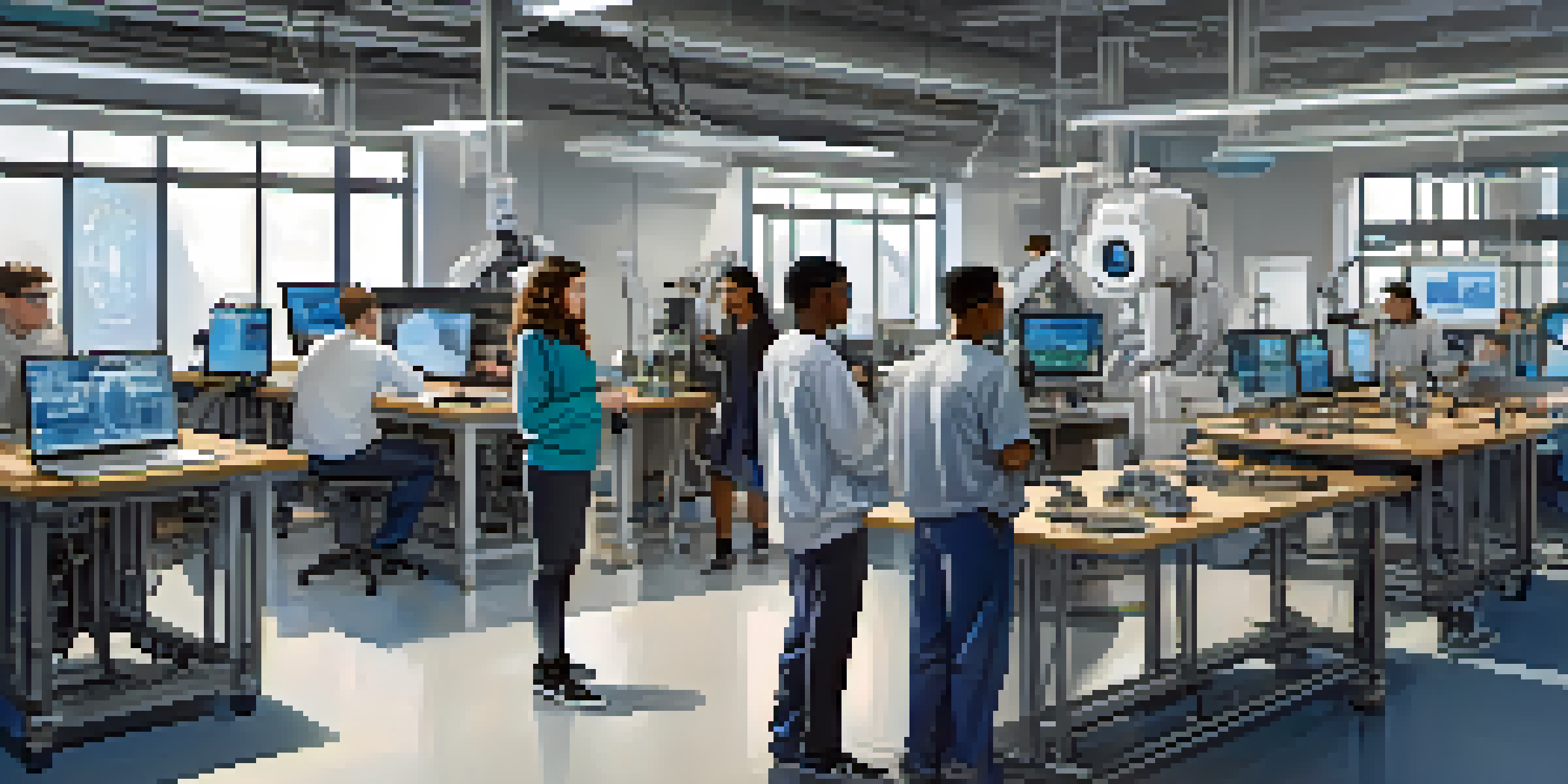Innovative Engineering Programs at Carnegie Mellon University

Overview of Carnegie Mellon's Engineering Excellence
Carnegie Mellon University (CMU) has long been a leader in engineering education, consistently ranking among the top institutions worldwide. With a unique blend of rigorous academics and innovative research, CMU prepares students to tackle real-world challenges in engineering. The School of Engineering embodies a collaborative spirit, encouraging interdisciplinary projects that blend technology with creativity.
The best way to predict the future is to invent it.
The university’s approach to engineering emphasizes not just technical skills but also problem-solving and critical thinking. This holistic education model is designed to produce well-rounded engineers who can adapt to the ever-evolving landscape of technology and industry. As a result, CMU graduates are highly sought after by employers across various sectors.
From robotics to biomedical engineering, CMU offers a diverse array of programs that cater to a wide range of interests. The commitment to innovation and excellence ensures that students are equipped with the knowledge and experience needed to make significant contributions to their fields.
The Robotics Institute: Pioneering the Future of Automation
One of the standout programs at CMU is the Robotics Institute, renowned for its groundbreaking research and education in robotics. This institute focuses on developing intelligent machines that can assist in various industries, including healthcare, manufacturing, and transportation. Students engage in hands-on projects, gaining practical experience in building and programming robots.

The Robotics Institute also fosters collaboration with industry leaders, allowing students to work on real-world problems and gain insights into the latest technological advancements. This partnership with companies provides invaluable networking opportunities and enhances students' employability upon graduation. As a result, many graduates find themselves at the forefront of the robotics revolution.
Engineering Excellence at CMU
Carnegie Mellon University consistently ranks among the top engineering schools, offering rigorous academics and innovative research that prepare students for real-world challenges.
In addition to traditional robotics, the institute explores emerging fields such as artificial intelligence and machine learning. By integrating these disciplines, CMU prepares students to lead in an increasingly automated world where robotics plays a crucial role in everyday life.
Biomedical Engineering: Merging Medicine with Technology
Carnegie Mellon's Biomedical Engineering program is another shining example of innovation, focusing on improving healthcare through engineering solutions. This interdisciplinary field combines biology, medicine, and engineering principles to develop advanced medical devices and treatments. Students learn to apply engineering techniques to solve pressing health challenges, making a direct impact on patient care.
Innovation distinguishes between a leader and a follower.
The program emphasizes hands-on learning, with students participating in research projects that aim to improve medical technologies. Collaborations with hospitals and medical research institutions allow students to work on real-life problems, providing them with invaluable experience. This practical approach not only enhances their technical skills but also their understanding of the healthcare landscape.
Moreover, CMU's commitment to interdisciplinary education means that students often collaborate with peers from other fields, such as computer science and design. This collaborative environment fosters creativity and innovation, equipping graduates with the diverse skill set needed to thrive in the fast-paced world of biomedical engineering.
Environmental Engineering: A Commitment to Sustainability
CMU's Environmental Engineering program stands out for its focus on sustainability and environmental stewardship. Students in this program learn to tackle critical issues such as pollution control, water resource management, and sustainable design. By integrating engineering principles with environmental science, they are equipped to develop solutions that promote a healthier planet.
The curriculum emphasizes hands-on experiences, including field studies and laboratory work, enabling students to apply theoretical knowledge to real-world situations. Projects often involve collaboration with local communities and organizations, addressing pressing environmental concerns directly. This community engagement not only enhances learning but also instills a sense of responsibility in students.
Interdisciplinary Collaboration
CMU emphasizes interdisciplinary collaboration, allowing students to integrate knowledge across various fields to tackle complex engineering problems.
Additionally, CMU's commitment to sustainability extends beyond the classroom, with research initiatives aimed at addressing global environmental challenges. Graduates of this program are prepared to become leaders in the field, advocating for innovative practices that prioritize ecological balance and sustainability.
Computer Engineering: Bridging Hardware and Software
The Computer Engineering program at CMU uniquely combines hardware and software education, preparing students for diverse careers in technology. Students gain a comprehensive understanding of computer systems, learning to design and optimize both the physical components and the software that drives them. This dual focus is essential in a world where technology is increasingly integrated into everyday life.
The program encourages innovation through hands-on projects and research opportunities, allowing students to explore cutting-edge topics such as embedded systems and cybersecurity. By working alongside faculty members who are leaders in their fields, students gain insights into the latest developments and trends in computer engineering. This exposure enhances their learning experience and prepares them for the demands of the tech industry.
Moreover, CMU's strong emphasis on collaboration with industry partners provides students with valuable connections and real-world experiences. Internships and co-op programs enable students to apply their skills in practical settings, making them highly competitive in the job market upon graduation.
The Importance of Interdisciplinary Collaboration
One of the key features of engineering programs at Carnegie Mellon is the emphasis on interdisciplinary collaboration. Students are encouraged to work across disciplines, integrating knowledge from various fields to solve complex problems. This approach mirrors the reality of modern engineering, where projects often require expertise from multiple areas.
For example, a project in autonomous vehicles may involve collaboration between mechanical engineers, computer scientists, and designers. By fostering teamwork and communication skills, CMU prepares students to thrive in diverse professional environments. This collaborative spirit enhances creativity and innovation, allowing students to develop well-rounded solutions to pressing issues.
Strong Career Outcomes for Graduates
CMU graduates are highly sought after by employers, thanks to their hands-on experience and the university's strong connections within the industry.
Furthermore, CMU's facilities support this interdisciplinary work, providing state-of-the-art labs and resources for students to explore their ideas. The university's culture of collaboration not only enriches the learning experience but also helps students build a professional network that can benefit them throughout their careers.
Research Opportunities: Fueling Innovation and Discovery
Research is at the heart of Carnegie Mellon’s engineering programs, providing students with countless opportunities to contribute to groundbreaking projects. CMU is home to various research centers and laboratories, where students can engage in cutting-edge studies alongside renowned faculty. This hands-on research experience is invaluable in preparing students for careers in academia or industry.
Students are encouraged to pursue their interests, whether in robotics, renewable energy, or data science, leading to innovative discoveries that can make a significant impact. The university’s commitment to research also means that students often have the chance to publish their findings, adding to their professional credentials. This emphasis on research not only enhances their learning but also instills a sense of curiosity and ambition.

Moreover, CMU actively collaborates with industry partners and government agencies, allowing students to work on real-world challenges that extend beyond the classroom. These partnerships provide additional resources and funding for research projects, further enriching the educational experience and fostering a culture of innovation.
Career Outcomes: Success in the Engineering Field
Graduates of Carnegie Mellon's engineering programs are well-equipped for success in their careers, thanks to the university’s rigorous education and strong industry connections. Many CMU alumni go on to secure positions at top companies, including Google, Apple, and Tesla. The university’s reputation for excellence in engineering makes graduates highly sought after in the job market.
The hands-on experience gained through internships, co-ops, and research projects gives students a competitive edge. Employers appreciate the practical skills and innovative thinking that CMU graduates bring to the table. This strong emphasis on real-world experience not only enhances their resumes but also prepares them for the challenges they will face in their careers.
Additionally, CMU’s extensive alumni network provides ongoing support and mentorship for graduates. This network can be a valuable resource for job seekers, offering insights into industry trends and potential job openings. As a result, graduates are often well-positioned to advance in their careers and make meaningful contributions to their fields.